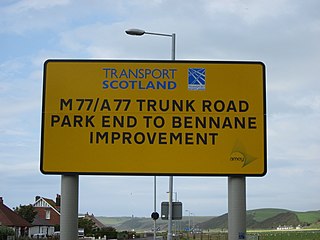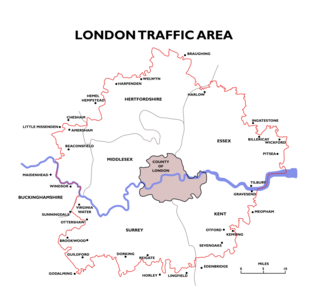
The Department for Transport (DfT) is a ministerial department of the Government of the United Kingdom. It is responsible for the English transport network and a limited number of transport matters in Scotland, Wales, and Northern Ireland that have not been devolved. The department is run by the Secretary of State for Transport, currently, Mark Harper.
The British Transport Commission (BTC) was created by Clement Attlee's post-war Labour government as a part of its nationalisation programme, to oversee railways, canals and road freight transport in Great Britain. Its general duty under the Transport Act 1947 was to provide an efficient, adequate, economical and properly integrated system of public inland transport and port facilities within Great Britain for passengers and goods, excluding transport by air.

The Cheshire Lines Committee (CLC) was formed in the 1860s and became the second-largest joint railway in Great Britain. The committee, which was often styled the Cheshire Lines Railway, operated 143 miles (230 km) of track in the then counties of Lancashire and Cheshire. The railway did not become part of the Big Four during the implementation of the 1923 grouping, surviving independently with its own management until the railways were nationalised at the beginning of 1948. The railway served Liverpool, Manchester, Stockport, Warrington, Widnes, Northwich, Winsford, Knutsford, Chester and Southport with connections to many other railways.

The Office of Rail and Road (ORR) is a non-ministerial government department responsible for the economic and safety regulation of Britain's railways, and the economic monitoring of National Highways.

The Inquiries Act 2005 is an Act of the Parliament of the United Kingdom. According to the explanatory notes, published by the Department for Constitutional Affairs, the Act "is intended to provide a comprehensive statutory framework for inquiries set up by Ministers to look into matters of public concern".

Vehicle and Operator Services Agency (VOSA) was an executive agency granted trading fund status in the United Kingdom sponsored by the Department for Transport of the United Kingdom Government.

The transport system in Scotland is generally well-developed. The Scottish Government and Scottish Parliament has control over most elements of transport policy within Scotland, with the Cabinet Secretary for Transport, Net Zero and Just Transition holding portfolio responsibility within the Scottish Government. Transport Scotland is the Executive Agency responsible for the Scottish transport network.

The Electricity Act 1947 was an act of the Parliament of the United Kingdom which nationalised, or bought into state control, the electricity supply industry in Great Britain. It established a central authority called the British Electricity Authority (BEA) to own and operate all public electricity generation and transmission facilities and created 14 area electricity boards with a duty to acquire bulk supplies of electricity from the central authority and to distribute and sell electricity economically and efficiently to industrial, commercial and domestic consumers. It vested 505 separate local authority and company owned electricity undertakings in the BEA with effect from 1 April 1948. The Electricity Act 1947 is one of a number of acts promulgated by the post-war Labour government to nationalise elements of the UK’s industrial infrastructure; other acts include the Coal Industry Nationalisation Act 1946; Transport Act 1947 ; Gas Act 1948; and Iron and Steel Act 1949.

The Health and Safety at Work etc. Act 1974 is an act of the Parliament of the United Kingdom that as of 2011 defines the fundamental structure and authority for the encouragement, regulation and enforcement of workplace health, safety and welfare within the United Kingdom.

The Town and Country Planning Act 1990 is an act of the Parliament of the United Kingdom regulating the development of land in England and Wales. It is a central part of English land law in that it concerns town and country planning in the United Kingdom. Repealed in parts by the Planning and Compensation Act 1991, it is now also complemented by the Planning and Compulsory Purchase Act 2004.

The Road Traffic Regulation Act 1984 is an Act of the Parliament of the United Kingdom, which provided powers to regulate or restrict traffic on roads in Great Britain, in the interest of safety. It superseded some earlier legislation, including the majority of the Road Traffic Regulation Act 1967. The Act is split into 10 parts covering 147 sections, it also includes 14 schedules.

The London Traffic Act 1924 was an Act of the Parliament of the United Kingdom. The purpose of the Act was stated to be the facilitating and improving the regulation of traffic in and near London.

The United Kingdom has a number of intercity coach services.

The Deregulation and Contracting Out Act 1994 is an Act of Parliament. It introduced wide-ranging measures with aims including reducing burdern on people in trade created by previous Acts such as the Shops Act 1950, changes in transport legislation, changes in utility legislation, changes in financial services among others.

The Electricity Act 1989 provided for the privatisation of the electricity supply industry in Great Britain, by replacing the Central Electricity Generating Board in England and Wales and by restructuring the South of Scotland Electricity Board and the North of Scotland Hydro-Electric Board. The Act also established a licensing regime and a regulator for the industry called the Office of Electricity Regulation (OFFER), which has since become the Office of Gas and Electricity Markets (OFGEM).

The Road Traffic Act 1988 is an Act of the Parliament of the United Kingdom, concerning licensing of vehicles, insurance and road regulation.

The Petroleum (Consolidation) Act 1929 is an act of the Parliament of Northern Ireland which consolidates enactments relating to petroleum and petroleum products that already applied to other parts of the United Kingdom.











